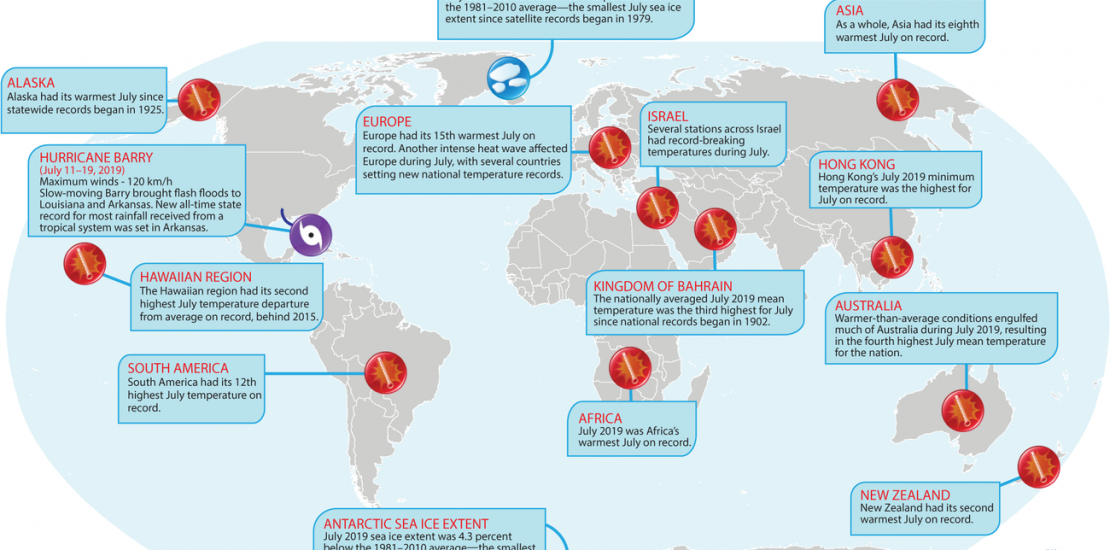NOAA says July was warmest month on record for the globe
- August 27, 2019
- Posted by: administrator
- Category: Environmental, Global, Water Issues, Arctic & Antarctica

The global land and ocean surface temperature departure from average for July 2019 was the highest for the month of July, according to the US National Oceanic and Atmospheric Administration (NOAA).
This makes it the warmest month overall in the 140-year NOAA global temperature dataset record, which dates back to 1880.
The year-to-date temperature for 2019 tied with 2017 as the second warmest January–July on record.
The July temperature across global land and ocean surfaces was 1.71°F above the 20th century average of 60.4°F and was the highest for July in the 1880–2019 record. July 2019 bested the previous record—set in 2016—by 0.05°F.
Nine of the 10 warmest Julys have occurred since 2005, with the last five years (2015–2019) being the five warmest Julys on record. July 1998 is the only value from the previous century among the 10 warmest Julys on record.
July 2019 also marks the 43rd consecutive July and the 415th consecutive month with temperatures, at least nominally, above the 20th century average.
Record warm July temperatures were present across parts of North America, southern Asia, southern Africa, the northern Indian Ocean, and the Atlantic Ocean, as well as across the western and northern parts of the Pacific Ocean. No land or ocean areas had record cold July temperatures.
The July globally averaged land surface temperature was 2.21°F above the 20th century average of 57.8°F and the second-highest July land temperature in the 140-year record. July 2017 holds the record for the highest July global land temperature departure from average at 2.23°F.
The most notable warm temperature departures from average were present across Alaska, central Europe, northern and southwestern parts of Asia, and parts of Africa and Australia, where temperatures were at least 2.7°F above the 1981–2010 average or higher.
The most notable cooler-than-average temperatures were present across parts of Scandinavia and western and eastern Russia, where temperatures were at least 2.7°F below average or cooler.
Regionally, North America, Africa, Asia, Oceania, the Hawaiian region, the Caribbean region, and the Gulf of Mexico had a July temperature departure from average that ranked among the 10 warmest Julys on record. Of note, Africa had its warmest July at 2.97°F, besting the previous record set in 2015 by 0.32°F.
The July globally averaged sea surface temperature was 1.51°F above the 20th century monthly average of 61.5°F and the highest global sea surface temperature for July on record. The 10 highest global ocean monthly temperature departures from average have all occurred since September 2015.
Arctic sea ice extent set record low for July
The Arctic sea ice extent set a record low for July at 726,000 square miles (19.8%) below the 1981–2010 average and 30,900 square miles below the now second-lowest July sea ice extent set in 2012, according to an analysis by the National Snow and Ice Data Center using data from NOAA and NASA.
During July 2019, sea ice loss occurred at an average rate of 40,800 square miles per day, surpassing the 1981–2010 average of 33,500 square miles. Only seven other years (1990, 1991, 2007, 2009, 2013, 2015, and 2018) had a daily rate of sea ice loss exceeding 38,600 square miles.
The July 2019 Antarctic sea ice extent was 260,000 square miles (4.3%) below the 1981–2010 average and was the smallest July extent in the 41-year record.
